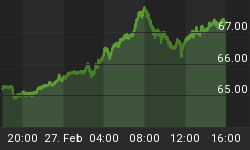Later this month Congress will have an unprecedented opportunity to force the Federal Reserve to provide meaningful transparency to lawmakers and taxpayers. HR 459, my bill known as "Audit the Fed," is scheduled for a vote before the full Congress in July. More than 270 of my colleagues cosponsored the bill, and it has the support of congressional leadership. But its passage in the House of Representatives is only the beginning of the battle, as many Senators and the President still don't see the critical need to have a national discussionabout monetary policy.
The American public now senses that the Fed's actions, especially since 2008, are enormously inflationary and will cause great harm to the American economy in the long run. They are beginning to understand what so many economists still don't understand, which is that inflation is a monetary phenomenon, and rising prices are merely a symptom of that phenomenon. Prices eventually rise when the supply of US dollars (paper or electronic) grows faster than the available goods and services being chased by those dollars.
This fundamental truth has been thoroughly explained by Milton Friedman and many others, so today's Keynesian economists have no excuse for their claims that "inflation is under control." Ordinary Americans don't need a PhD simply to look at the Fed's balance sheet and understand the staggering amount of money creation that has occurred in recent years. They know it will have harmful consequences for all of us eventually.
I've spoken at length about inflation, and how Fed money creation is effectively a tax. Every dollar created out of thin air dilutes the value of the dollars in your pocket and your savings in the bank. But the truth is that we are only beginning to see the results of the Fed's dramatic increase in the money supply. As former Fed Chair Alan Greenspan himself explained last week to Larry Kudlow, most of the dollar deposits created by the Fed via successive rounds of "quantitative easing" remain on the balance sheet of Fed member banks. Because of very rational economic fears, banks are not lending, businesses are not expanding, and individuals are shedding debt. So, the trillions of dollars created by the Fed since 2008 remained largely undeployed. When those dollars eventually make their way into the world economy, prices across all sectors of the economy are likely to rise dramatically.
The true evil of inflation is that newly created money benefits politically favored financial interests, especially banks, on the front end. Over time, however, the net result of monetary inflation is always the devaluation of savings and purchasing power. This devaluation discourages saving, which is the key to capital accumulation and investment in a healthy economy. Inflation also tends to hurt seniors and those living on fixed incomes the most.
For decades the Fed has operated without any meaningful oversight whatsoever, resulting in the loss of savings, loss of purchasing power, and loss of quality of life for all Americans. It causes individuals and businesses to make bad decisions, misallocating their capital because market signals have been distorted. It causes financial ruin by engineering the inevitable boom and bust cycles that so many erroneously blame on capitalism. And it does all this in secrecy, to the benefit of the financial and political classes. It is time to Audit the Fed, as a first step toward ending its unchecked power over our money and economic fortunes.















